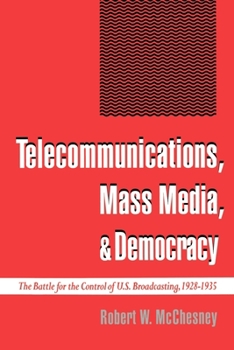Telecommunications, Mass Media, and Democracy: The Battle for the Control of U.S. Broadcasting, 1928-1935
Select Format
Select Condition 
Book Overview
This work shows in detail the emergence and consolidation of U.S. commercial broadcasting economically, politically, and ideologically. This process was met by organized opposition and a general level of public antipathy that has been almost entirely overlooked by previous scholarship. McChesney highlights the activities and arguments of this early broadcast reform movement of the 1930s. The reformers argued that commercial broadcasting was inimical...
Format:Paperback
Language:English
ISBN:0195093941
ISBN13:9780195093940
Release Date:January 1995
Publisher:Oxford University Press
Length:416 Pages
Weight:1.55 lbs.
Dimensions:1.1" x 6.2" x 9.3"
Related Subjects
Arts, Music & Photography Biological Sciences Biology & Life Sciences Botany Business & Finance Clinical Communication & Journalism Communication & Media Studies Communications Democracy Education & Reference Engineering General Broadcasting Geriatrics Humanities Ideologies & Doctrines Media Studies Performing Arts Political Ideologies Political Science Politics & Government Politics & Social Sciences Radio Science Science & Math Science & Scientists Science & Technology Skills Social Science Social Sciences Technology TextbooksCustomer Reviews
1 rating
History Repeats
Published by Thriftbooks.com User , 16 years ago
Robert McChesney has become one of our leading media critics and activists, and in this debut book from 1993 he was already adept at exploring why concentrated corporate media is an affront to democracy. Granted, at the time of this book McChesney was not yet wearing his democratic (small "d") politics so prominently on his sleeve, and was more concerned with the historical forces that have shaped the media mess that we're in now. While media reform is a struggling, yet growing, movement today, it was a force to be reckoned with the last time media policy was a source of widespread public concern in this country. That was way back in the 1928-1935 period, when the federal government was still trying to figure out how to regulate the airwaves, resulting in the 1934 creation of the FCC. At the time, it would have still been possible to create a true public broadcasting system in America, with benefits for civil society and social justice, as well as for-profit companies who would be encouraged to use the system wisely. But instead we ended up with the current advertiser-driven lowest-common-denominator system, in which mega-conglomerate corporate profits are the main (and usually the only) concern for federal media and telecommunications policy. McChesney provides plenty of evidence that this emergence of a corporate media system was not inevitable and was instead the result of government deliberations in which fairly well-organized non-profit activists (especially religious, educational, and labor groups) were unable to resist an onslaught of self-serving rhetoric and influence peddling by the big media companies. Here we can see how history really does repeat itself, and knowledgeable readers will be painfully familiar with the false arguments about democracy and freedom that big media used then and now. The only problem with this book is that while it is intricately and impeccably researched, the straight chronological history and voluminous government documents used by McChesney result in a very repetitive and unexciting read. McChesney's later works are more passionate and readable, notwithstanding their increased polemics. Here the monotonous reading is not entirely rewarding for the interested scholar until an excellent concluding chapter, in which McChesnay lays out how much we can learn from this deceptively dry political history, and finally delivers on the book's weighty title. [~doomsdayer520~]






